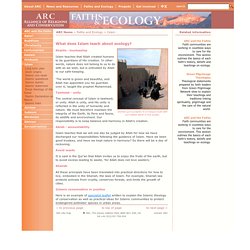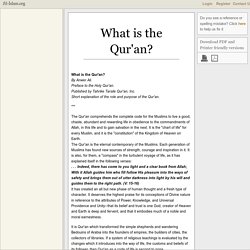

Religion: Islam. ARC - Faiths and ecology - What does Islam teach about ecology? Khalifa - trusteeship Islam teaches that Allah created humans to be guardians of His creation.

In other words, nature does not belong to us to do with as we wish, but is entrusted by Allah to our safe-keeping. ‘The world is green and beautiful, and Allah has appointed you his guardian over it,’ taught the prophet Muhammad. Tawheed - unity. The Ka’aba, The House Of Allah. In the province of Hejaz in the western part of Arabia, not far from the Red Sea, there lies the town of Makka.

In the center of this town there is a small square building made of stones, about 60 feet long, 60 feet wide and 60 feet high. Since time immemorial this town and this stone built house has been known to world travelers. This is Baitullah, the House of Allah. Its sanctity and antiquity is older than history itself. The term Fundamentalism in Christianity and Islam. Fundamentalism in Christianity: In Christianity, the term fundamentalism is normally used to refer to the conservative part of evangelical Christianity, which is itself the most conservative wing of Protestant Christianity.

Fundamentalist Christians typically believe that the Bible is inspired by God and is inerrant. They reject modern analysis of the Bible as a historical document written by authors who were attempting to promote their own evolving spiritual beliefs. Rather, they view the bible as the Word of God, internally consistent, and free of error. The term "Fundamentalist" derives from a 1909 publication "The Fundamentals: A testimony to the truth" which proposed five required Christian beliefs for those opposed to the Modernist movement. Originally a technical theological term, it became commonly used after the "Scopes" trial in Tennessee during the mid 1920s. In the U.S., the Fundamentalist-led Moral Majority emerged to challenge social and religious beliefs and practices.
Nation of Islam - Faiths & Prayer - Beliefnet.com. Islam: beliefs and practices. Islamic Laws. Sharia law. Why is sharia law in the news?

An Islamic court in Nigeria yesterday upheld a sentence of death by stoning for a woman accused of adultery. The case is the latest in a series of sentences passed under sharia law - a set of religious laws adopted over the past two years in northern regions of Nigeria, which have predominantly Muslim inhabitants. Sharia law, which derives from the teachings of the Koran and from Sunna (the practice of the prophet Mohammed), is implemented to varying degrees in different Islamic countries - from the beheadings of Saudi Arabia, to the relatively liberal social mores of Malaysia.
What is sharia? The word sharia means "the path to a watering hole". It is adopted by most Muslims to a greater or lesser degree as a matter of personal conscience, but it can also be formally instituted as law by certain states and enforced by the courts. What does sharia decree? What are Hadd offences? What is the Qur'an? What is the Qur'an?

By Anwer Ali.Preface to the Holy Qur'an. Religions - Islam: Hajj: pilgrimage to Mecca. Religions - Islam: Five Pillars of Islam. Islam's Sunni-Shiite split. To the outsider, the differences between the Sunni and Shiite Islamic sects are hard to recognize.

The five pillars of Islam – daily prayer; fasting during Ramadan; alms giving; the pilgrimage to Mecca; and belief in one, unitary god – are at the core of both faiths, and most mainstream clerics in each denomination recognize adherents of the other side as "legitimate" Muslims. The Koran is the sacred text for both. They believe Muhammad was the prophet and that there will be a resurrection followed by a final judgment when the world ends.
Adding to the potential confusion is the insistence of many Muslims not to be identified as Shiite or Sunni, saying they are Muslims and Muslims only. Afterlife and Salvation. Written by: Beth Davies-Stofka Muslims believe in the Day of Judgment and heaven and hell.

A person's ultimate destiny, whether it is heaven or hell, depends on the degree to which that person intended and acted as God desires, with justice and mercy toward others. While it is impossible to know with certainty who will go to heaven and hell, believers, who had faith in the revelations that God sent through his prophets and lived according to those revelations, may hope for heaven. There is some evidence that nonbelievers can attain paradise, and even those who do evil but who are met at the end with God's grace and mercy may attain paradise. All of creation is journeying toward God, and the world will end on some unknown day. Islam does not teach that humans need intercession, although some traditions have allowed that Muhammad might intercede with God on humanity's behalf.
Trade and the Spread of Islam in Africa. Religions - Islam: Hijab. Islamic Holidays (Ramadan, Muharram, Mawlid al-Nabi, and more) Muharram (1 Muharram): The Islamic New Year The month of Muharram marks the beginning of the Islamic liturgical year.

The Islamic year begins on the first day of Muharram, and is counted from the year of the Hegira (anno Hegirae) the year in which Muhammad emigrated from Mecca to Medina (A.D. July 16, 622). The Islamic new year is celebrated relatively quietly, with prayers and readings and reflection upon the hegira. Mawlid al-Nabi (12 Rabi 1): Prophet Muhammad's Birthday. Religions - Islam: Jihad. Sunni Islam Origins, Sunni Islam History, Sunni Islam Beliefs. The followers of Sunni Islam, one of the two major branches of the tradition (the other is Shi'a), make up approximately 80 percent of the Muslim population in the world.

The Sunni are the majority in most Islamic countries outside of Iran, Iraq, Yemen, and Bahrain. Sunna—translated variously as the "trodden path," "the way," "example," or "habitual practice"—refers to the example or path of the Prophet Muhammad and his followers. The Sunni and Shi'a both trace their differences to the 7th century C.E., when disagreements over the successor to the Prophet Muhammad arose. Islam: Governing Under Sharia. Introduction Sharia, or Islamic law, influences the legal code in most Muslim countries.

A movement to allow sharia to govern personal status law, a set of regulations that pertain to marriage, divorce, inheritance, and custody, is even expanding into the West. "There are so many varying interpretations of what sharia actually means that in some places, it can be incorporated into political systems relatively easily," says CFR's Steven A. Cook. Sharia's influence on both personal status law and criminal law is highly controversial. What is Sharia? Also meaning "path" in Arabic, sharia guides all aspects of Muslim life, including daily routines, familial and religious obligations, and financial dealings. The Nature of Islamic Art. Religion. Alternate title: Al-Islām Islam, major world religion promulgated by the Prophet Muhammad in Arabia in the 7th century ce.
The Arabic term islām, literally “surrender,” illuminates the fundamental religious idea of Islam—that the believer (called a Muslim, from the active particle of islām) accepts surrender to the will of Allah (in Arabic, Allāh: God). Allah is viewed as the sole God—creator, sustainer, and restorer of the world. The will of Allah, to which human beings must submit, is made known through the sacred scriptures, the Qurʾān (often spelled Koran in English), which Allah revealed to his messenger, Muhammad. In Islam Muhammad is ... (100 of 29,257 words) <ul><li><a href="/EBchecked/media/111453/Abu-Darweesh-Mosque-in-Amman-Jordan? The Women of Islam. For his day, the Prophet Muhammad was a feminist. The doctrine he laid out as the revealed word of God considerably improved the status of women in 7th century Arabia. In local pagan society, it was the custom to bury alive unwanted female newborns; Islam prohibited the practice. Women had been treated as possessions of their husbands; Islamic law made the education of girls a sacred duty and gave women the right to own and inherit property.
Muhammad even decreed that sexual satisfaction was a woman's entitlement. He was a liberal at home as well as in the pulpit. Of course, ancient advances do not mean that much to women 14 centuries later if reform is, rather than a process, a historical blip subject to reversal. Part of the problem dates to Muhammad. Texts of Islam. Sacred-texts home Journal Articles: Islam OCRT: Islam Buy CD-ROM Buy books about Islam Qur'an Hadith Sufi Texts Islamic History and Culture Islamic Date Qur'an The Qur'an is the primary text of Islam, revealed to the Prophet Muhammed beginning in the year 610 C.E.
It was canonicalized between 644 and 656. The Qur'an is required reading for anyone who wants to understand Islam. Hypertext Qur'anThis page links together all of the Qur'an versions at this site. Unicode Qur'anThe Arabic text of the Qur'an presented using Unicode. The Holy Qur'an: Arabic Text, Pronunciation Guide, Yusuf Ali English TextA merged version of the excellent Yusuf Ali English translation in parallel with Arabic. The Qur’ân, Part I tr. by E.H. The Qur’ân, Part II tr. by E.H. Comparing and contrasting Christianity and Islam. Comparing religions Sponsored link.
Overview: Judaism, Christianity, and Islam are three closely related religions. Because they all revere Abraham and certain other patriarchs mentioned in the Hebrew Scriptures (the Torah), Christian Scriptures (Old and New Testaments) and Qur'an as their spiritual ancestors, they are sometimes called Abrahamic religions. The Baha'i Faith is sometimes also included in this grouping. Introduction to Islam. The religion of Islam. Islam Origins, Islam History, Islam Beliefs. Islam is a monotheistic religious tradition that developed in the Middle East in the 7th century C.E. Religion: Islam.